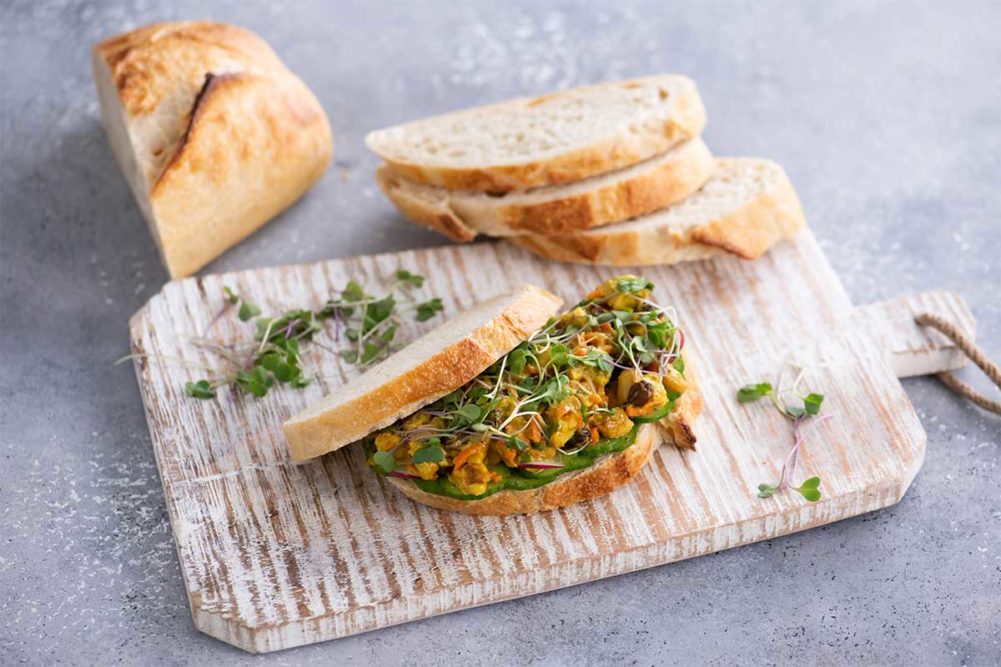Sourdough bread bakers are interested in cultivating a relationship of transparency with customers and experimenting with alternative grains.
“We want to celebrate the farmers; we want to celebrate where our food comes from rather than being shy about it,” said Jon Davis, head of culinary innovation at Aspire Bakeries, Los Angeles, which owns La Brea Bakery. “We don’t use preservatives; we don’t use any weird stuff in there. We’re not trying to be tricky. It’s right there on the package.”
Artisan bakers who make sourdough breads are starting to explore alternative and heirloom grains as the world turns its attention to the need for sustainability. Bakers are helping to bring back heirloom seeds and grains.
“Sustainability is just getting bigger and bigger,” said Peter Reinhart, author, baking instructor and executive director of the International Symposium on Bread at Johnson and Wales University. “Whole grains became a big step about 15 to 18 years ago, and then these heirloom grains and sprouted grains. Every time something new pops up, bakers who have dialed in on what they were already working on have to ask, ‘Should I just stand pat? Or do I need to shake things up a little bit and keep up with what’s going on next?’ ”
This is also part of what he calls the farmer-miller-baker collaboration. Bakers interested in exploring ancient or heirloom grains must be able to find them.
“In order for that specialty flour category to grow, you need bakers who are willing to get out of their comfort zone to work with grains that are not as predictable, that maybe will vary from season to season and that they can’t go on automatic,” he said. “And the millers have to be willing — because they’re the ones who are commissioning the farmers to grow — they have to be like customers. They’re working together, and a lot of this is starting just like the artisan bread movement; it’s starting at small local mills. … Almost every state has one or more small mills that specialize in locally grown or regionally sourced grain.”
Mr. Davis said that when La Brea Bakery began more than 30 years ago, there was only one bread flour available. But he’s exploring ancient and heirloom grains now by testing recipes with whole grains because alternative flours are much more available than they’ve been in the past. He’s tried making quinoa sourdough and whole wheat sourdoughs.
“Right now we see all these local millers experimenting with different flours, different grains, different varietals or cultivars of wheat, so there’s a lot more availability of different kinds of ingredients, and it’s really great to have,” he said. “There are a lot more small milling operations going on and small farmers getting out into the marketplace with their items.”
Companion Baking, St. Louis, has been working with Anheuser-Busch to consider applications for spent grain from the beer brewing process in baked foods. Josh Allen, founder and owner of Companion Baking, said it hasn’t been turned into any products yet, but they recognize it’s a place the market may go as a response to consumer demand for sustainable products. Upcycled ingredients can minimize food waste and close supply chain loops.
Mr. Reinhart also mentioned the promise of sprouted flours. Controlled grain sprouting in facilities means that the sprouting can be managed and stopped at the ideal moment. This produces a functional flour that will taste sweeter, he said.
“It’s essentially preconditioning the wheat to go through these changes to make them more digestible by pre-sprouting them,” Mr. Reinhart said. “Wellness alone will not cause somebody to eat your bread if it doesn’t taste good, so the other part of that puzzle is the craft has to be there, and bakers have to really know how to evoke the full potential of the flavor and nutrition that’s trapped in that grain. And they’re learning.”
This article is an excerpt from the September 2021 issue of Baking & Snack. To read the entire feature on Sourdough, click here.






